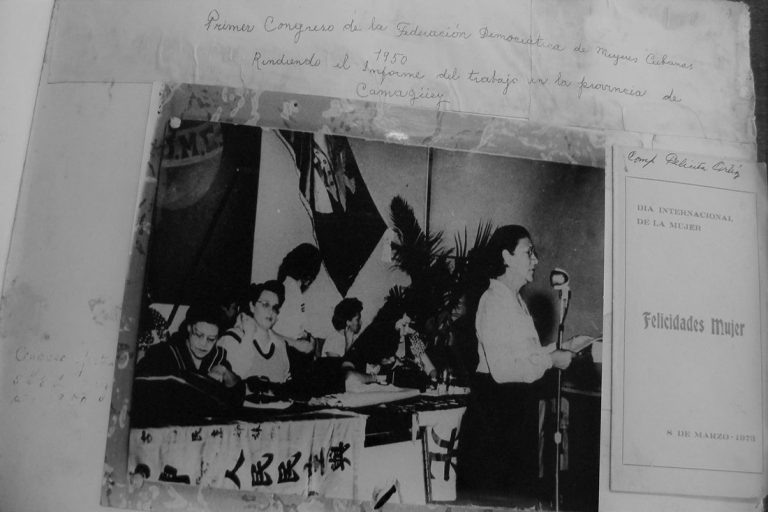On July 4th, 1949, the Camagüey Delegation was founded as part of the Democratic Federation of Cuban Women. In the house located at 558 Oscar Primelles Street, 49 women from Camaguey discussed, approved the national regulations and the directive that ruled their destiny during the 1949-1951 biennium.
The board was chaired by Julia Heredero Lastra and as secretary the well-known political leader of the Popular Socialist Party and the Communist Party Felicita Ortiz Córdova.
The candidature presented and approved consisted of a president, 6 vice-presidents. A board of secretariats and its corresponding vice: of the organization, of minutes and correspondence, of propaganda, of finances.
As follows: President: Julia Heredero Lastra, 1st. Vice President: Felicita Ortiz Córdova, 2nd. Arminda González, 3rd. Maria Novoa, 4th. Adela Arango, 5th. Catalina Rodríguez, 6th. Georgina de Urra Parrado and as secretaries: Julia Benemelis Vázquez with Ascensión Gregorí; Flora Morales Varona with Longina Cuba Viera; Zoila Molina Betancourt with Adelina Landrián; Rufina Gómez foundling with Dulce Criado Diago. Also a group of twelve spokespeople.
Political practices performed
Gradual access to political and government spaces is systematized, in their participation as councilors, members and leaders of left-wing parties, professionals and social movements.
They began to transgress with their participation a discriminatory political culture in governments and political parties. Consequently, the scarce appreciation of the capacities and contributions of women to the exercise of political power. Likewise, they helped to promote from this associative platform programs that promote the participation of women, and demonstrated that women are not only useful for caring for her family.
Women were made visible in political advertisements in the print press, her voices of social reach in writing, radio, science, in democratic, inclusive and free instruction.
These women were an example of not passively accepting exclusionary contexts. They turned this Federation into a learning center against fascism, discrimination and the social and political death of the subaltern layers.
They stood out as avant-garde women, committed to systemic democracy from the locality, the nation and in the international demands of a socially just structural behavior.
Legacy
An ethic of justice, in favor of equality and equity from its own bosom and constitution of membership and board. They also developed an ethic of criticism from the knowledge and denunciation of the structures and dynamics that impede social justice and generate discrimination and inequalities.
They were distinguished by their challenge to the contexts by assuming as a social project proposal a society that transforms patterns of behaviors inherited and maintained from a culture of privilege and contempt for ordinary and humble people.
Bibliography
Archivo Histórico Provincial Camagüey: Fondo Asociaciones. Leg. 65 Exp. 5
Álbum de Felicita Ortíz Córdova al Archivo Histórico Provincial Camagüey.
Translated by: Aileen Álvarez García






